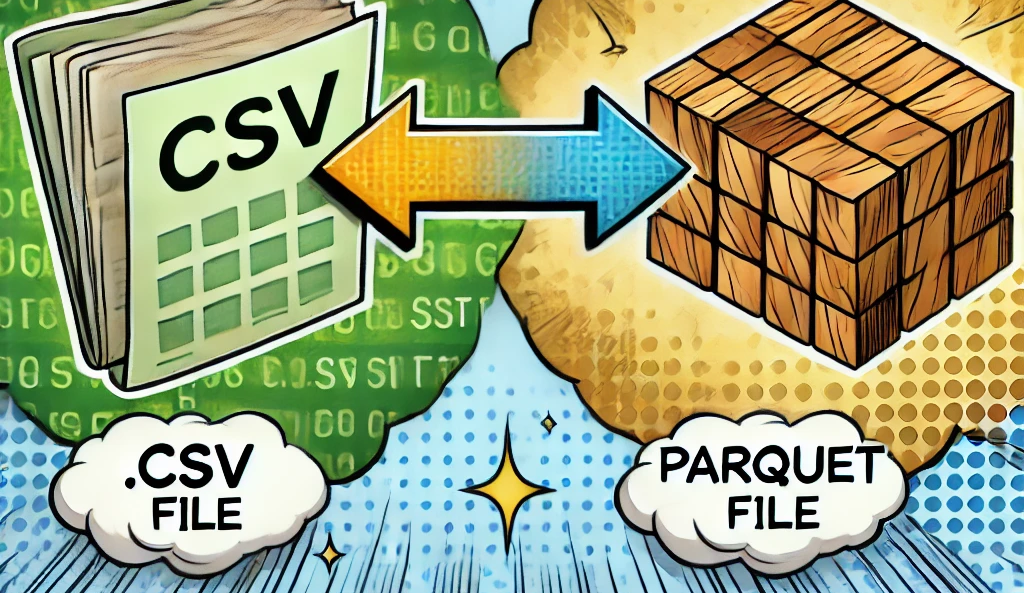Introduction
In the ever-evolving world of data engineering, efficiency and scalability are key factors when handling large datasets. Csv2Parquet, a newly released open-source Java project, offers an elegant solution for transforming CSV files into the Parquet format, along with tools for schema generation and data analysis. Designed with modern data workflows in mind, Csv2Parquet is not just another tool—it’s a game-changer for engineers looking to optimize their data pipelines.
Why Parquet Over CSV?
While CSV remains a widely used format due to its simplicity, its limitations become apparent when dealing with large-scale data or modern architectures like Data Lakes. Here’s why Parquet outshines CSV:
- Efficient Compression
- Parquet natively supports advanced compression algorithms like Snappy, Gzip, and Zstandard, significantly reducing storage costs.
- For instance, a 540,000-row CSV file may consume several times the storage space of its Parquet equivalent.
- Integrated Data Schema
- Parquet files include detailed metadata, such as column types and structures, enabling precise and error-free data handling.
- CSV, by contrast, lacks built-in schema support, often requiring manual or automated type inference, which can lead to errors.
- Optimized for Columnar Processing
- Parquet’s columnar storage format allows you to read or write only the necessary columns, reducing I/O overhead.
- With CSV, every operation requires processing the entire row, even if you only need specific columns.
- Seamless Integration with Modern Systems
- Parquet is natively supported by popular Big Data tools such as Apache Spark, Hive, Trino, and platforms like Databricks and SnowFlake.
- CSV requires additional transformation steps to achieve similar levels of integration and performance.
- Data Precision and Robustness
- Parquet preserves precise data types, including timestamps and floating-point values, ensuring consistency.
- CSV formats can introduce inconsistencies, especially with regional differences in date or number formats.
- Scalability and Schema Evolution
- Parquet allows for column addition or removal without reprocessing entire datasets.
- CSV schema changes often demand manual intervention, increasing complexity.
- Cost-Efficiency
- By minimizing storage requirements and optimizing data access patterns, Parquet saves costs in distributed environments where storage and compute resources are at a premium.
About Csv2Parquet
Csv2Parquet was originally developed as part of the InfiniteStack platform by SciCrop, specifically as a library within the Collect feature of InfiniteStack. Collect enables seamless data integration from diverse sources, making Csv2Parquet an essential component for handling CSV transformations.
Features of Csv2Parquet
- Dynamic Schema Inference
- Automatically generate Avro schemas from CSV headers and sample data.
- No manual schema definition required.
- CSV to Parquet Conversion
- Quickly transform CSV files into highly efficient Parquet files.
- Support for configurable delimiters and compression codecs like Snappy.
- Parquet File Analysis
- Inspect Parquet files with tools to count records, view samples, and generate column-level statistics.
- Inspect Parquet files with tools to count records, view samples, and generate column-level statistics.
- Schema Generator
- Dynamically create Avro schemas programmatically using Java
Mapobjects.
- Dynamically create Avro schemas programmatically using Java
- Comprehensive JUnit 5 Test Suite
- Includes a robust suite of unit tests to validate functionality and ensure reliability.
Why Java?
Csv2Parquet leverages the power of Java and its trusted Apache libraries for Parquet and Avro. Here’s why Java is the perfect choice for this tool:
- Performance and Scalability
- Java’s high-performance runtime and efficient garbage collection make it ideal for handling large datasets.
- Robust Ecosystem
- The tool integrates Apache Parquet, Apache Avro, and Apache Commons CSV, ensuring reliability and extensive community support.
- Type Safety
- Java’s type system ensures schema consistency, minimizing runtime errors and improving developer confidence.
- Cross-Platform Compatibility
- Java applications can run on any platform, ensuring Csv2Parquet is widely accessible.
Getting Started
Prerequisites
- Java 17 or higher
- Maven 3.6+
Usage
- Clone the repository:
git clone https://github.com/Scicrop/csv2parquet.gitcd csv2parquet - Build the project:
mvn clean install - Run the tool:
- Convert CSV to Parquet:
bash java com.scicrop.infinitestack.GenericCSVToParquet /path/to/input.csv /path/to/output.parquet , - Analyze a Parquet file:
bash java com.scicrop.infinitestack.ParquetFileAnalyzer /path/to/output.parquet - Generate Avro Schema:
bash java com.scicrop.infinitestack.SchemaGenerator
- Convert CSV to Parquet:
Conclusion
Csv2Parquet is your gateway to efficient data transformation, robust storage, and modern data workflows. Whether you’re working with legacy systems or building scalable pipelines, Csv2Parquet offers a reliable and powerful solution.

